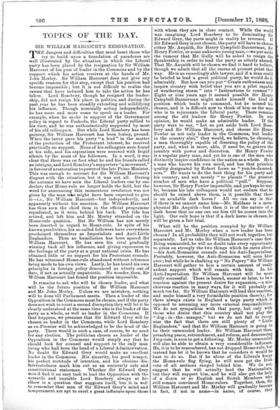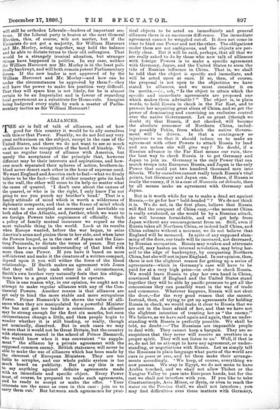TOPICS OF THE DAY.
SIR WILLIAM HARCOURT'S RESIGNATION. THE dangers and difficulties that must beset those who try to build upon a foundation of paradoxes are well illustrated by the situation in which the Liberal party has been placed by the resignation by Sir William Harcourt of his post of leader in the Commons and by the support which his action receives at the hands of Mr. John Morley. Sir William Harcourt does not give any specific reasons for this step, except that his position had become impossible ; but it is not difficult to realise the causes that have induced him to take the action he has taken. Lord Rosebery, though he resigned the leader- ship, did not resign his place in politics, and during the past year be has been steadily extending and solidifying his influence. Though nominally acting independently, he has more and more come to speak as a leader. For example, when he spoke in support of the Government policy in regard to Fashoda, the Liberal party rallied to his view, and he was enthusiastically supported by most of his old colleagues. But while Lord Rosebery has been gaining, Sir William Harcourt has been losing, ground. When the latter gave his party "a lead" in the matter of the protection of the Protestant interest, he received practically no support. None of his colleagues were found at his side, and his aspirations were received with frigid silence by the mass of his followers. In a word, it was clear that there was on foot what he and his friends called an intrigue, and Lord Rosebery's supporters "a movement," in favour of arestoration to power of the late Prime Minister. This was enough to account for Sir William Harcourt's disgust with the situation, but it was not all. During the autumn we have seen the Liberal leaders one by one declare that Home-rule no longer holds the field, but the word for announcing this momentous revolution was not given by the man wlao might have been expected to give it—i.e., Sir William Harcourt—but independently, and apparently without his sanction. Sir William Harcourt has thus seen the chief item in the official programme repudiated, as it were, behind his back. The tide has retired, and left him and Mr. Morley stranded on the Home-rule question. But Sir William has not merely been deserted in regard to Home-rule. In spite of his known proclivities, his so-called followers have everywhere proclaimed themselves as Imperialists and Anti-Little Englanders. Thus no humiliation has been spared Sir William Harcourt. He has seen his rival gradually winning back all his influence, and giving expression to the feelings of the party at a great national crisis. He has obtained little or no support for his Protestant crusade. He has witnessed Home-rule abandoned without reference being made to his own views. Lastly, he has heard his own principles in foreign policy denounced as utterly out of date, if not as actually unpatriotic. No wonder, then, Sir William Harcourt has found the position impossible.
It remains to ask who will be chosen leader, and what will be the future position of Sir William Harcourt and Mr. John Morley. Unless we are mistaken, nothing will be done till Parliament meets. Then a leader of the Opposition in the Commons must be chosen, and if the party does not wish to court a second disruption they will let it be clearly understood at the same time who is the leader of the party as a whole, as well as leader in the Commons. If that happens, we presume that Sir Edward Grey will be chosen as leader in the Commons, while Lord Rosebery as ex-Premier will be acknowledged to be the head of the party. There would in such a case, of course, be no need for any election. The politician chosen as leader of the Opposition in the Commons would simply say that he should look for counsel and support to the only man living who had been the head of a Liberal Administration. No doubt Sir Edward Grey would make an excellent leader in the Commons. His sincerity, his good temper, his perfect rectitude of intention, and his obvious dis- tnterestedness mark him out as an eminently safe and constitutional statesman. Whether Sir Edward Grey would find it an easy task to lead the Opposition with the versatile and unstable Lord Rosebery always at his elbow is a question that suggests itself, but it is well to remember that men of Sir Edward Grey's mind and temperament are apt to exert a great influence upon those with whom they are in close contact. While the world was imagining Lord Rosebery to be dominating Sir Edward Grey, the parts might in reality be reversed. If Sir Edward Grey is not chosen, the party will have to choose. either Mr. Asquith, Sir Henry Campbell-Bannerman, Sir Henry Fowler, or some unknown young man,—we put aside the rumour that Mr. Gully will be asked to resign the Speakership in order to lead the party as utterly absurd. That Mr. Asquith will be chosen we find it hard to believe, though we admit that all the omens at present point that way. He is an exceedingly able lawyer, and if a man could be briefed to lead a great political party, he would do it admirably. But how can you put " Create enthusiasm and inspire country with belief that you are a pilot capable of weathering storm " into " Instructions to counsel " ? Eight or nine years ago it seemed possible Sir Henry Campbell-Bannerman might make himself the kind of position which leads to command, but he missed his chance, and it is difficult now to think of him as the man who is to rejuvenate the Liberal party. There remains. among the old leaders Sir Henry Fowler. In our opinion, he would make an admirable leader. If the were to say, " Let us put aside both Lord Rose- bery and Sir William Harcourt, and choose Sir Henry Fowler as not only leader in the Commons, but leader in the country also," they would, we believe, be choosing a man thoroughly capable of directing the policy of the party, and, what is more, able, if need be, to govern the country with power and discretion. Sir Henry Fowler is a regular party man, and yet he is one of the men who distinctly inspire confidence in the nation as a whole. He is a man who knows his own mind, and has that priceless. quality designated by Robert Lowe as " you-be.damned- ness." He wants to do the best thing for his party and his country, and not merely " to placate " the greatest number of men who have a political " pull." Suppose,. however, Sir Henry Fowler impossible, and perhaps he may be, because his late colleagues would not endure that he should be raised above them, is it possible that there is an available dark horse ? All we can say is that if there is we cannot name him—Mr. Haldane is a meta- physical Mr. Asquith—but then it is of the nature of a dark horse that no one can see him till he comes into the light. Our only hope is that if a dark horse is chosen, he- will be given a, fair trial.
What will be the position occupied by Sir William Harcourt and Mr. Morley when a new leader has been chosen ? In all probability they will not work together, but separately. Let us take Sir William Harcourt's case first. Being unmuzzled, he will no doubt take every opportunity to press on strongly the two things which he cares about, —his Anti-Romanism crusade and his Anti-Imperialism. Probably, however, the Anti-Romanism will soon blow over; but while he is chalking up " No Popery" Sir William Harcourt will gather to him a, certain amount of really ardent support which will remain with him. In his Anti-Imperialism Sir William Harcourt will be more really successful. There is bound, sooner or later, to be a reaction against the present desire for expansion,—a mis- chievous reaction in many ways, for it will probably go much too far. Sir William Harcourt will lead this reaction, and make himself a very formidable position thereby, for there always exists in England a large party which is opposed to assuming any more external responsibilities. We do not sympathise with that party, but only with those who desire that this country shall not play the " dog - in - the - manger," but we do not fail to recog- nise the fact that there are still plenty of " Little Englanders," and that Sir William Harcourt is going to be their unmuzzled leader. Sir William Harcourt then, preaching peace, retrenchment, and reform, and denouncing Jingoism, is sure to get a following. Mr. Morley unmuzzled will also be able to obtain a very considerable influence. He, it is to be remembered, has not dropped Home-rule, but instead has let it be known that he considers it would be base to do so. But if he alone of the Liberals keeps the Home-rule flag flying, he will soon get the Irish vote of all sections ranged behind him. We do not, suggest that he will actually lead the Nationalists, but they will support him, and he will also get the help of a dozen or so English and Scotch Members who still remain convinced Home-rulers. Together, then, Sir William Harcourt and Mr. Morley will gradually become in fact, if not in name—in name, of course, they will still be orthodox Liberals—leaders of important sec- tions. If the Liberal party is beaten at the next General Election, this, of course, will not matter, but if the Unionists do not get a majority, Sir William Harcourt and Mr. Morley, acting together, may hold the balance and be able to dictate terms to their old colleagues. That would be a strangely ironical situation, but stranger things have happened in politics. In any case, neither Sir William Harcourt nor Mr. Morley is in the least poli- ticallybankrupt, and will both remain potent Parliamentary forces. If the new leader is not approved of by Sir William Harcourt and Mr. Morley—and how can he under the circumstances be approved by them ?—they will have the power to make his position very difficult. That they will spare him is not likely, for he is almost certain to be an Imperialist and in favour of regarding local government as a substitute for Home-rule. Imagine being badgered every night by such a master of Parlia- mentary tactics as Sir William Harcourt !











































 Previous page
Previous page